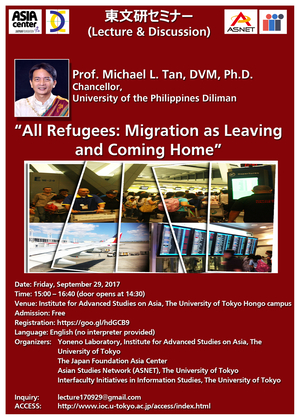With this opportunity of having Dr. Michael Lim Tan, the Chancellor of the University of the Philippines, Diliman as the invitee in the framework of the Japan Foundation Asia Center Cultural Leader’s Invitation Program, we would like to host a lecture event at the University of Tokyo.
Date: Friday, September 29, 2017
Timetable: 15:00-16:40 (*Doors open:14:30)
Venue: Large Meeting Room, Institute for Advanced Studies on Asia(3rd floor)
Admission fee: Free
* Pre-registration: https://goo.gl/hdGCB9
* First-come-first-served basis, for those who did not pre-register
* 100 seats.
Language: English *With no interpretation provided.
Abstract:
Migration has been a burning issue in the last few years, mainly by way of restricting people's movements. My presentation will look at migration as people in search of a home, and how we are all descended from refugees. The Chinese and Japanese words for refugees are the same 逃难, fleeing hardship and "hardship" or adversity has many definitions: economic, political, religious, and very personal ones. Migration spurred the expansion of Homo sapiens, and created many new possibilities for the development of humanity.
I will use examples from the Philippines, especially in relation to Japan, to show the great diversity in migration, with emphasis on liminality, the period of uncertainty because of adjustments, and legal restrictions. In today's turbulent world, the reasons for fleeing hardship have expanded many times over and it is important that societies become more compassionate, understanding that leaving one's home can be a very difficult decision to make, with the next generations of migrants sometimes choosing to return to their origins. Ultimately, migration is a matter of looking for, and making a home.
Organizers: Institute for Advanced Studies on Asia (c/o Yoneno Laboratory), The University of Tokyo
The Japan Foundation Asia Center
Asian Studies Network (ASNET), The Univeristy of Tokyo
Interfaculty Initiative in Information Studies, The University of Tokyo
Inquiry: lecture170929(at)gmail.com

